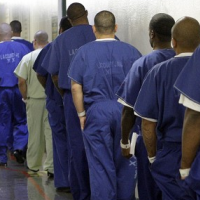Non-White Inmates Are More Profitable for Private Prisons
 (photo: Associated Press)
(photo: Associated Press)
Private prison companies know exactly what kind of inmate they want to make their operations profitable: minorities.
A study (pdf) out of University of California, Berkeley shows people of color—who make up the majority of the U.S. prison population—are even more overrepresented in private correctional facilities, compared to state-run prisons.
In California and three of the other states examined—Georgia, Oklahoma and Texas—the share of blacks and Hispanics in private prison population was at least 10 percentage points greater than in state-run facilities.
This is not by accident. Companies like The GEO Group and Corrections Corporation of America (CCA), two of the industry’s leaders, want black and Hispanic prisoners because they tend to be younger than white inmates, due to the passage of mandatory sentencing laws in the 1980s that targeted drug offenders (who tended to be minorities).
Younger prisoners are cheaper to care for than older ones, due to medical costs, which is why private prisons want more minorities.
“Based on historical sentencing patterns, if you are a prisoner today, and you are over 50 years old, there is a greater likelihood that you are white,” Christopher Petrella, a doctoral candidate at Berkeley and the study’s author, told BillMoyers.com. “If you are under 50 years old—particularly if you’re closer to 30 years old—you’re more likely to be a person of color.”
Petrella’s study drew on data from eight states besides California—Arizona, Colorado, Georgia, Mississippi, Ohio, Oklahoma, Tennessee, and Texas. They were chosen for their “reliably large sample size.” But the accessibility of data was not uniform between the states. A study footnote complained that “the California Department of Corrections and Rehabilitation has been incredibly uncooperative in releasing data pertaining to the proportion of prisoners age 50 and older in minimum/medium-security public and private facilities.”
The study said it would make certain assumptions about where California incarcerated its inmates over 50 because the new California Health Care Facility in Stockton was the only prison in the state charged with handling those in need of acute and long-term medical and psychiatric care. Events partially overtook the report last month when a federal monitor halted new admissions to the facility, citing a “serious risk of harm.”
California had 12,300 inmates in private prisons as of October 2013.
The American Civil Liberties Union (ACLU) issued a report two years ago that revealed it costs $34,135 annually to house a non-geriatric prisoner, compared with $68,270 for a prisoner age 50 or older.
“I came to find out that through explicit and implicit exemptions written into contracts between these private prison management companies and state departments of correction, many of these privates—namely GEO and CCA, the two largest private, for-profit prison companies—write exemptions for certain types of prisoners into their contracts,” Petrella said. “And, as you can guess, the prisoners they like to house are low-cost prisoners. . . . Those prisoners tend to be younger, and they tend to be much healthier.”
Of the 32 states that contract with private prison operators, 30 of them showed that state-run correctional facilities had smaller minorities-to-whites ratios in their populations than private prisons.
“One of the reasons I think the study’s important,” Petrella told BillMoyers.com, “is that it continues to show how laws—and even contractual stipulations—that are, on the surface, race-neutral, continue to have a disproportionate and negative impact on communities of color.”
–Noel Brinkerhoff
To Learn More:
Higher Profits Explain Why There Are More People of Color in Private Prisons (by Joshua Holland, Moyers & Company)
6 Companies that Make Their Money Ensnaring People in Our Prison System (by Aaron Cantú, AlterNet)
The Color of Corporate Corrections, Part II: Contractual Exemptions and the Overrepresentation of People of Color in Private Prisons (by Christopher, Radical Criminology) (pdf)
African-American Inmates Sue Private Prison Company for Endangering Them by Housing Them with Hispanic Gangs (by Noel Brinkerhoff, AllGov)
Prison Sentences for Black Men Are 20% Longer Than Those for White Men for Same Crimes (by Noel Brinkerhoff, AllGov)
Federal Monitor Cites “Serious Risk of Harm,” Blocks Admissions to State's Newest Prison (by Ken Broder, AllGov California)
- Top Stories
- Controversies
- Where is the Money Going?
- California and the Nation
- Appointments and Resignations
- Unusual News
- Latest News
- California Forbids U.S. Immigration Agents from Pretending to be Police
- California Lawmakers Urged to Strip “Self-Dealing” Tax Board of Its Duties
- Big Oil’s Grip on California
- Santa Cruz Police See Homeland Security Betrayal in Use of Gang Roundup as Cover for Immigration Raid
- Oil Companies Face Deadline to Stop Polluting California Groundwater





